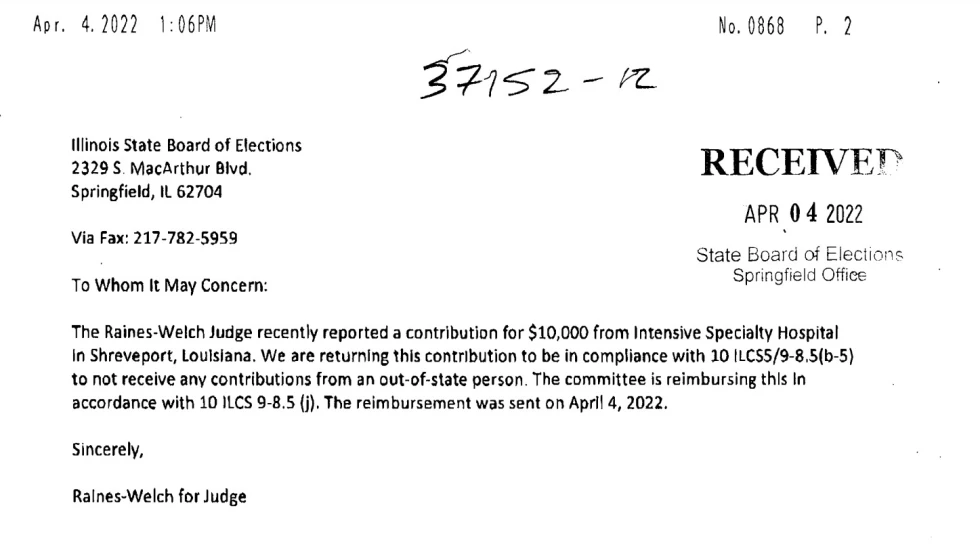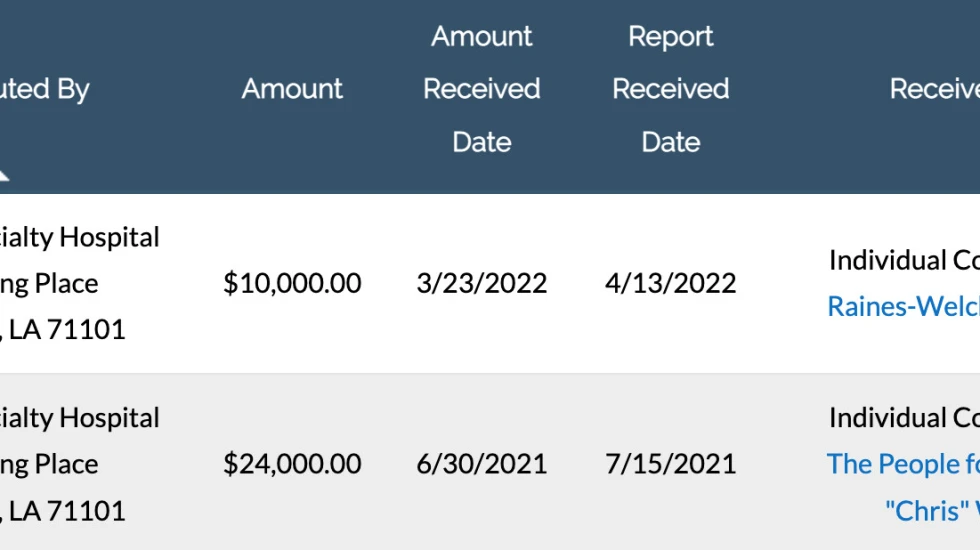
Cook County judicial hopeful ShawnTe Raines-Welch has returned a $10,000 campaign contribution that violated a new state law, enacted with the backing of her husband, Illinois House Speaker Emanuel “Chris” Welch, banning out-of-state financing for judicial candidates in Illinois.
In records filed with the state election board, Raines-Welch’s campaign listed the contribution as having come from Intensive Specialty Hospital of Shreveport, Louisiana.
But that was news to the chief executive officer of the hospital, Keith Cox. Asked about the campaign money, Cox told the Chicago Sun-Times he had “no earthly idea” why the contribution was made to someone running for judge in another state or that it had come from his hospital.
Intensive Specialty Hospital is a subsidiary of Cedar Health Group, a New Jersey healthcare company that benefited from another change in Illinois law that also had Welch’s backing in Springfield.
That change in the law allowed another Cedar Health affiliate to bypass some of the regulatory bureaucracy involving approvals from the Illinois Health Facilities and Services Review Board. That agency’s OK is needed for any hospital in the state to be built or shut down or to make other significant changes, including reopening.
Cedar Health executives got approval last year from the board to reopen shuttered Westlake Hospital in Melrose Park as Woodlake Specialty Hospital.

When Gov. J.B. Pritzker signed the measure into law in April 2021, Welch was quoted in a news release saying: “After fighting more than a year to keep Westlake Hospital open, I thank Gov. Pritzker for swiftly signing SB 168 into law. Because of our quick action, it’s now easier to sell and reopen Westlake Hospital since it meets criteria for serving underserved, low-income communities.”
Woodlake is expected to open at the old Westlake site by the end of this year, with more than 200 beds.
Cox said it’s possible the campaign contribution to the speaker’s wife in his hospital’s name originated with someone at corporate parent Cedar Health, though the new Illinois law barring out-of-state judicial contributions also bans campaign money being contributed in the name of any person or entity other than whoever the money came from.
Cedar Health officials didn’t respond to calls or emails seeking comment.
Welch wouldn’t comment.
Raines-Welch, who faces a contested June 28 Democratic primary in a judicial district that stretches from the northwest suburbs to the southwest suburbs, declined an interview request.
In a written statement, David Ormsby, her campaign spokesman, said: “The contribution to the Raines-Welch for Judge campaign from Intensive Specialty Hospital in Shreveport came entirely unsolicited. No one from the campaign and no one remotely associated with the campaign — no volunteer, no friend, no relative — at no time solicited the contribution.
“Additionally, the campaign’s vetting system identified the contribution as ineligible and returned it and notified the State Board of Elections on April 4, 2022, before receiving the board’s official notice. Our vetting worked. End of story.”

The former Westlake Hospital has been closed since August 2019 and surrendered its state license that November to the Illinois Department of Public Health.
Former owner Tenet Healthcare had sold the hospital more than three years ago along with Weiss Memorial Hospital on the North Side and West Suburban Medical Center in Oak Park for $70 million to a California company, Pipeline Health.
Pipeline initially pledged to keep all three hospitals open but soon said it would close Westlake, which served a large number of low-income patients. The company — whose executives included Dr. Eric Whitaker, a friend of former President Barack Obama — cited huge financial losses. Westlake filed for bankruptcy.
The planned closing sparked outrage and lawsuits.
At the time, Welch was a member of Westlake’s governing board and was critical of Pipeline for closing the hospital.
Moving to find a way to see it reopen, the speaker filed legislation on March 15, 2021, to help “a party seeking to reestablish a previously discontinued general acute care hospital,” with the specifications tailored to the Woodlake group.
The legislation, which also had key backing from state Rep. Kathleen Willis, D-Addison, was approved by both chambers of the General Assembly on March 25, 2021.
On March 26, 2021, lobbyist Ben Lazare’s firm, which represented Woodlake, gave $3,750 to the speaker’s campaign fund, records show. Reached by phone, Lazare said, “I have no comment, thank you.”
The governor signed the measure in April 2021.
On June 15, 2021, members of the Woodlake group testified before state regulators on their application to reopen the hospital.
“It’s a very unique project, as you will recall, we were actually able to work with the House and the Senate and the governor to get legislation introduced and passed to sort of expedite the reopening of Woodlake Hospital well, Westlake, now known as Woodlake Hospital,” their lawyer said.
The group said it plans to invest more than $40 million in the Melrose Park hospital.
One Cedar Health executive testified: “Our goal is to make Woodlake a one-stop shop for continual geriatric, psychiatric and post-acute care conditions. . . . Woodlake will treat all patients regardless of their ability to pay.”
On June 30, 2021, Welch’s campaign reported receiving a $24,000 contribution from the Shreveport hospital, according to Illinois State Board of Elections records.
On Aug. 17, 2021, state regulators approved the plan for Woodlake to open.
Months later, on March 23, the Shreveport hospital made the $10,000 contribution to Welch’s wife, campaign-finance records show.

On April 4, her campaign fund sent a letter, signed “Raines-Welch for Judge,” to the state elections board, saying:
“To Whom It May Concern: The Raines-Welch Judge recently reported a contribution for $10,000 from Intensive Specialty Hospital in Shreveport, Louisiana. We are returning this contribution to be in compliance with 10 ILCS5/9-8.5(b-5) to not receive any contributions from an out-of-state person. The committee is reimbursing this in accordance with 10 ILCS 9-8.5 (j). The reimbursement was sent on April 4, 2022.”
Matt Dietrich, a spokesman for the elections board, said the agency notified her campaign fund that the Shreveport hospital’s contribution was a violation of the law — which Welch had voted on this past fall — that “prohibits out-of-state contributions for judicial candidates.”
According to Raines-Welch spokesman Ormsby, the campaign notified the elections board before getting that letter: “The election board’s U.S. post office-delivered notice and the campaign’s faxed letter to the board, noting the contribution’s return, crossed in the mail.”
There’s no penalty under the new law as long as any out-of-state contribution to a judicial campaign is returned.
By the end of March, the elections board also had notified 19 other judicial campaigns of similar problems with out-of-state contributions.
Raines-Welch has gotten mixed reviews from bar groups that rate judicial candidates. The Chicago Council of Lawyers found her “qualified.” The Hispanic Lawyers Association of Illinois recently announced it found her “not qualified,” citing what it said was a “lack of legal knowledge, lack of trial experience and lack of reliability.”





